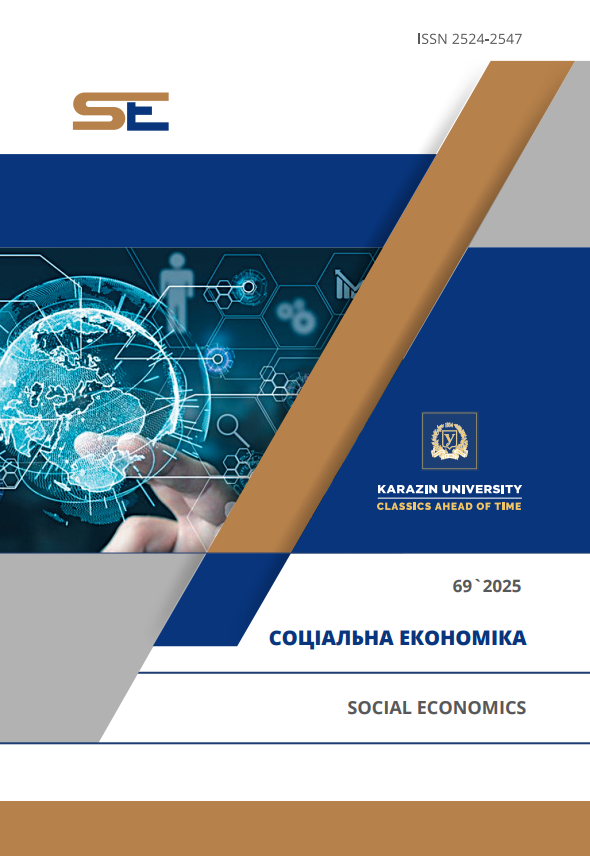CRISIS MANAGEMENT STRATEGIES FOR THE HOTEL BUSINESS IN CONDITIONS OF MARKET TURBULENCE AND UNCERTAINTY
Abstract
The hotel business is one of the most vulnerable sectors of the economy, as its operations directly depend on macroeconomic stability, tourist demand, and global crises. Between 2022 and 2025, the hospitality industry faced significant challenges related to the COVID-19 pandemic, military conflicts in Ukraine, changes in consumer preferences, and digital transformation. Under these circumstances, effective crisis management has become a key factor determining the ability of hotel enterprises to adapt to a changing environment, minimize losses, and maintain competitiveness.
This article examines crisis management strategies in the hotel industry under market turbulence and uncertainty. It analyzes the main factors influencing the operation of the hotel sector during crises, including economic and social risks, shifts in tourist flows, rising operational costs, the need for innovative technologies, and changes in business models. The study assesses the effectiveness of management decisions to ensure enterprises' sustainable development in challenging economic conditions.
The research identifies key approaches to crisis management, including the development of adaptive pricing strategies, service diversification, integration of digital technologies, improvement of personalized customer service, cost optimization, and alternative channels for hotel service distribution. Particular attention is paid to mechanisms for business process digitalization, customer service automation, the implementation of loyalty programs, and marketing management tools to increase room occupancy rates.
The findings indicate that effective crisis management requires a comprehensive approach that includes short-term liquidity support measures and long-term strategic decisions to build a flexible business model, adapt to changing market conditions, and create new growth opportunities. Hotel industry enterprises and government agencies can use the scientific and practical recommendations presented in the article to develop effective policies to support the hospitality sector during crises.
The results obtained can be valuable for practical application by hotel enterprise managers, market analysts, and researchers focusing on sustainable tourism and hospitality industry development. Future studies may focus on evaluating the effectiveness of implemented strategies in different hotel business segments, developing innovative business models to enhance profitability and resilience, and exploring opportunities for international cooperation to overcome the consequences of global crises.
Downloads
References
Hemmington, N., & Neill, L. (2021). Hospitality business longevity under COVID-19: The impact of COVID-19 on New Zealand’s hospitality industry. Tourism and Hospitality Research, 22(1), 102–114. doi: https://doi.org/10.1177/1467358421993875
Cocola-Gant, A., Jover, J., Carvalho, L., & Chamusca, P. (2021). Corporate hosts: The rise of professional management in the short-term rental industry. Tourism Management Perspectives, 41, Article 100879. doi: https://doi.org/10.1016/j.tmp.2021.100879
Wang, X., Guchait, P., Do, T. K., Paşamehmetoğlu, A., & Wen, X. (2024). Hospitality employees’ affective experience of shame, self-efficacy beliefs and job behaviors: The alleviating role of error tolerance. International Journal of Hospitality Management, 102, 103162. doi: https://doi.org/10.1016/j.ijhm.2022.103162
Vasilyeva, T., Kuzmenko, O., Kuryłowicz, M., & Letunovska, N. (2021). Neural network modeling of the economic and social development trajectory transformation due to quarantine restrictions during COVID-19. Economics and Sociology, 14(2), 313–330. doi: https://doi.org/10.14254/2071-789X.2021/14-2/17
Volianyk, H., Kolinko, N., & Shutka, S. (2024). Innovative digital technologies of e-commerce in the hotel industry. Innovations and Technologies in the Service Sphere and Food Industry, 2(12). doi: https://doi.org/10.32782/2708-4949.2(12).2024.4 (in Ukrainian)
Nyagadza, B., Chigora, F., Pashapa, R., Chuchu, T., Maeeresa, W., & Katsande, C. (2023). Effects of COVID-19 on tourism and hospitality: Exploring the new normal. In A. Çetinkaya, M. D. Alvarez, & M. Giritlioglu (Eds.), The Emerald handbook of destination recovery in tourism and hospitality (pp. 11–21). Emerald Publishing. doi: https://doi.org/10.1108/978-1-80262-073-320221002
Aghaei, H., Naderibeni, N., & Karimi, A. (2021). Designing a tourism business model on block chain platform. Tourism Management Perspectives, 39(8), Article 100845. doi: https://doi.org/10.1016/j.tmp.2021.100845
Müller, V. O. (2014). The impact of board composition on the financial performance of FTSE100 constituents. Procedia – Social and Behavioral Sciences, 109, 969–975. doi: https://doi.org/10.1016/j.sbspro.2013.12.573
Starovoit, V. V. (2024). Analysis of the effectiveness of digital marketing strategies to support the hotel business during a crisis. Actual Issues of Economic Sciences, 3–4. doi: https://doi.org/10.5281/zenodo.13945108 (in Ukrainian)
Wang, H., Zhang, B., & Qiu, H. (2022). How a hierarchical governance structure influences cultural heritage destination sustainability: A context of red tourism in China. Journal of Hospitality and Tourism Management, 50, 421–432. doi: https://doi.org/10.1016/j.jhtm.2022.02.002
Alvarez-Herranz, A., Balsalobre-Lorente, D., Shahbaz, M., & Cantos-Cantos, J. M. (2017). Energy innovations–GHG emissions nexus: Fresh empirical evidence from OECD countries. Energy Policy, 101, 90–100. doi: https://doi.org/10.1016/j.enpol.2016.11.030
Samodai, V., Rybalchenko, S., & Oryshchenko, Y. (2022). Anti-crisis management of hotel enterprises under martial law. Economy and Society, 44. doi: https://doi.org/10.32782/2524-0072/2022-44-35 (in Ukrainian)
Bozhidai, I. I., Artsybashev, G. R., & Larin, V. I. (2024). Research of the main principles of ecological-economic development of enterprises. Actual Issues of Economic Sciences, 3–4. doi: https://doi.org/10.5281/zenodo.13959444 (in Ukrainian)
Tsepurda, L., & Kurakin, O. (2024). Organizational aspects of improving the quality of hotel services in modern conditions. Hospitality, Service, Tourism: Experience, Problems, Innovations, 13(2), 123–130. (in Ukrainian)
Chepurda, L., & Bondarenko, O. (2023). Anti-crisis management of tourism enterprises: Theoretical aspects and practical recommendations. Scientific Bulletin of Kherson State University: Economic Sciences Series, 41, 112–118. (in Ukrainian)
Kovalenko, O. V., & Petrenko, A. I. (2025). Digital transformation of the hospitality industry: Challenges and prospects. Economy and Society, 45(1), 123–135. doi: https://doi.org/10.32782/2524-0072/2025-45-10
Stryzhak, O. O. (2021). Transformations of the tourism industry in the context of the digital economy. Economy and Management of the Agro-Industrial Complex, 2(169), 41–49. doi: https://doi.org/10.33245/2310-9262-2021-169-2-41-49 (in Ukrainian)
Hoarau-Heemstra, H., & Eide, D. (2016). Values and concern : Drivers of innovation in experience-based tourism. Tourism and Hospitality Research, 19(1), 15-26. doi: https://doi.org/10.1177/1467358416683768
Garafonova, O., Zhosan, H., Marhasova, V., Tkalenko, N., & Trukhachova, K. (2021). Matrix method of competitive analysis in strategic management of agricultural enterprises. Management Theory and Studies for Rural Business and Infrastructure Development, 43(2), 237–248. doi: https://doi.org/10.15544/mts.2021.20
Kyrylov, Y., Hranovska, V., & Zhosan, H. (2021). Formation of the national competitive model of agricultural enterprises development under the conditions of globalization. Bulletin of the National Academy of Sciences of the Republic of Kazakhstan, 2(390), 81–89. doi: https://doi.org/10.32014/2021.2518-1467.54

This work is licensed under a Creative Commons Attribution 4.0 International License.




